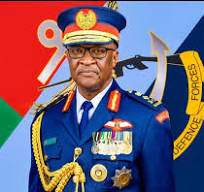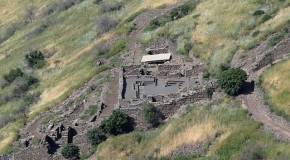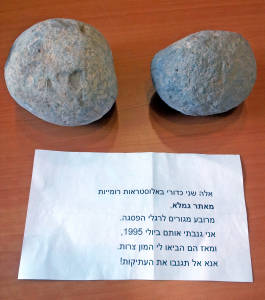At least a thousand Muslims worshipped in the mosque of Turkish President Recep Tayyip Erdogan’s presidential palace in Ankara on August 6. They performed a ceremony known as dhikr (“remembrance” in Arabic).
This event was heavily criticized by the country’s many secularists on the social media.

Hundreds of Muslims perform the dhikr ritual at Turkish President Erdogan’s palace on August 6. (Image source: Ferit Yağlı video screenshot) |
According to a video of the event, the Islamic cleric Ali Yetkin Sekerci, also known as “Galibi Sheikh Ali Yetkin Sekerci,” had the dhikr filmed. Sekerci often leads dhikr rituals in mosques.
Erdogan said in a speech in Ankara, in January 2015, that the presidential palace (or complex) would be re-named the “Presidential Kulliye” and would contain a mosque, convention center and a national library.
“Kulliye” refers to an Ottoman architectural concept of buildings that surround a mosque and are managed by the mosque.
While the Turkish-language website of the Turkish Presidency refers to the presidential palace as “the Kulliye”, the English website refers to it as “the Complex.”
The Millet Mosque, opened in Erdogan’s kulliye in July 2015, is a huge mosque can hold as many as 3,000 people. During the opening ceremony, Erdogan said: “Wherever there is a dome, a minaret today, we know it is the homeland of Muslims.”
Mucahid Cihad Han, (“Mujahedeen Jihad Khan”) who, while wearing his old-fashioned Islamic turban and cassock, conducts street interviews for the Islamist Ehli Sunnet TV, posted the video on his social media account.
“Dhikrullah in the heart of the Turkish state itself,” he wrote.
The expression “in the heart of the state” gives away the psychology of those who take pride in this ceremony. They appear to think that such public acts of “extreme Islamic devotion” right in the presidential palace are indications of their taking over the state.
This was the first dhikr performance held in a Turkish presidential complex in the history of republican Turkey.
Those who practice a dhikr at Erdogan’s presidential palace know that as the pro-government Muslims, they are the only religious group that could practice a religious ritual at such a high-level state institution. In a country where Islamic azan, or call to prayer, has been recited in Istanbul’s historic Hagia Sofia Church/Museum, now being converted into a mosque, no non-Muslim community would be allowed to practice such an open act of worship in any public setting.
This dhikr show seems to be another “test of patience” by the Islamist government applied on non-Islamists in Turkey, to measure the reactions of non-Islamists and convey an open message to them: Today is the day of dhikr in the heart of the state; get ready for more.
In April, Ismail Kahraman, the speaker of Turkey’s parliament, and an MP of the ruling AKP, said that “Laïcité [secularism] should not be in the new constitution in Turkey.”
The AKP government — through such statements and acts — seems to be warming up the Turkish public to “the future Islamic Republic of Turkey,” so that the people will not be shocked or revolt when they wake up to a completely and officially Islamized Turkey one day.
These were no traditional salah, daily prayers, or other common Islamic acts of worship in which one could humbly participate. What they did convey appears, instead, to be their pride in conquering the Turkish state.
“They do not do this as a sacred form of worship that they believe in,” said Kemal Bulbul, an Alevi author and community leader from Turkey.
“They hold such events to establish hegemony over society, to scare and terrorize people — mainly Alevis, secularists, Christians, and even Muslims who do not agree with their policies. They aim to silence, repress, and standardize the people.
“I have been threatened many times. My Facebook account has been closed three times. Even Facebook is discriminatory and taking sides against us.
“The Alevis especially are under grave threat. Alevis must stand guard in their villages now. After the June 15 attempted coup, some Islamists entered Alevi neighborhoods in convoys in many major cities such as Malatya, Hatay, and Izmir. They harassed, and threatened people. Not a single perpetrator has been arrested. If the government officials value democracy so much, what is stopping them from becoming a truly democratic government? Turkey, is at risk of massacres by the Islamic State. They might happen at any time. The situation is serious. I think there will be a bloodbath in Turkey if required precautions are not urgently taken against the Islamic State. Why are the United States government and the European Union turning a blind eye to what is happening in Turkey?”
Since mid-July, the Turkish government called on the citizens to join the “pro-democracy demonstrations.” Many people, however, took to the streets not to ask for more democracy, but to declare their desire for Islamist supremacy.
On 16 July, for example, another public dhikr performance was held in the Kizilay square in Ankara, just meters away from the Turkish parliament. According to the website Sendika.org, people in the square “recited takbir [‘Allahu akbar’], called for Islamic sharia law and jihad, and performed a dhikr.”
In Turkey — commonly, but falsely, described as a “secular state” — only Muslims (or devout Muslims) have full “religious liberty”, or, to put it more precisely, religious supremacy, which they often use to repress people of other religions or of no religion.
There are about 20 million Alevis in the country, but their faith, Alevism, and their places of worship, cem houses, are not officially recognized.
It was the founding government of Turkey, under the Republican People’s Party (CHP) that made the repression of Alevis legal and official.
A law enacted in 1925 during the rule of the CHP, which is still in effect in Turkey, bans Alevi religious centers and denies their faith. This law required the closure of the tekkes (dervish lodges), zaviyes (central dervish lodges) and tombs. The law also included the closure of Alevi religious centers.
For more than 90 years, Alevis have requested official recognition and equality, but their requests have not yet been met.
According to 2015 data of the state-funded Directorate for Religious Affairs (Diyanet), however, there are 86,762 mosques in Turkey.
Anatolia had been a Christian-majority territory before the Islamic invasion in 1071. Many Christians were slaughtered during and after the 1453 Ottoman invasion of Constantinople, officially renamed Istanbul by the Republic of Turkey in 1930. Over the centuries, countless churches in Anatolia have been destroyed, left to decay or, used for sacrilegious purposes, such as stables and storehouses.
One of the latest victims is the historic Greek Church in the city of Nigde, in terrible shape, one of the many humiliated churches in Turkey. The archaeologist Erman Ertugrul describes the situation of the church on the website Arkeofili:
“With its locked doors, the church has been left to its fate. The surrounding area has been turned into a garbage dump. It smells of urine and is filled with beer bottles. Graffiti covers the entire interior and exterior of the church. The church was used as a storehouse of the Nigde municipality for many years. After it was emptied, many people wrote their names with spray-paint or carved their names on the walls of the church.”
Christian Cappadocian Greeks were a people native to the region; they had a continuous presence there since antiquity. But between 1913 and 1922, the Greeks of Anatolia were exposed to forced deportation, mass murders, death marches, and other crimes at the hands of Muslim Turks. Their abandoned homes were then plundered or destroyed, alongside those of alongside the Armenians and Assyrians.
In 1923, the remaining Cappadocian Greeks were expelled from Turkey as part of the forcible population exchange between Greece and Turkey; many of their churches were converted to mosques. According to the UNESCO Atlas of the World’s Languages in Danger, Cappadocian Greek is now an extinct language.
Meanwhile, the Republic of Armenia is reportedly building the world’s largest Yazidi temple, which will also include a conference hall, seminary and museum, all designed as a symbol of resilience for persecuted worshippers, and scheduled to be completed next year.
Why do Turkish authorities not repair collapsing historic churches? Or do these churches remind them of who the indigenous people of Anatolia are — a fact many Turks are unwilling to accept? Why do they not build a giant church, and an Alevi cem house and a Yazidi temple in Ankara, as an act of solidarity with persecuted minorities, as an apology for the suffering Turkey has inflicted on its non-Muslim citizens?
Why does the Turkish government not allow a thousand Christian, Jewish, Yazidi or Alevi citizens of Turkey to carry out prayer services in the presidential palace — just for once? Or invite a group of secularists, atheists and agnostics to hold a seminar and press conference there, and give them a chance to discuss their ideas and concerns with the public? These acts would be meaningful gestures to the non-Muslim citizens of the country and help them feel that they are equal citizens of the country for whom the government cares as well.
But these things will never be. Islamic supremacists do not aim to establish a system where different communities can meaningfully and peacefully coexist. Instead, they aim for political and social domination in which non-Muslims will be second class, “tolerated” citizens — or dhimmis — who will always remain under threat.
While hundreds of Muslims in Turkey are holding dhikr events in public, in an apparent attempt to signal their power and hegemony over other people, Alevis stand guard at their villages for fear of violence by Islamist extremists, while ancient churches collapse and reek of urine.
So much for Turkish “secularism”.
Robert Jones, an expert on Turkey, is currently based in the UK.







































